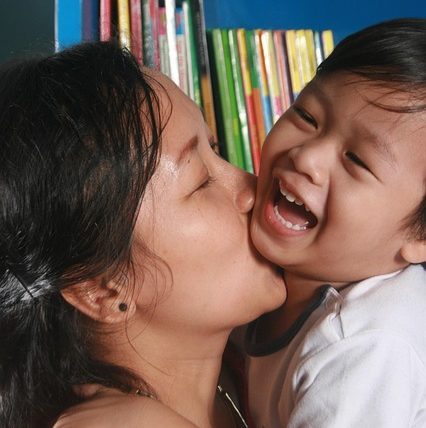
I recently wrote about shifting my approach to our morning routine from objective oriented to people oriented. I was thinking too much about the things that needed to be done (Clothes on! Beds made! Breakfast! Lunches! Shoes!) rather than the people who were meant to do them. When I began to worry less about the what and focused more on the who, things really started to change for us in the mornings.
I was passively participating in an online discussion group on the RIE/Mindful Parenting group and caught a conversation about really “seeing” your child during limit setting as apposed to focusing on the limit itself. I took this in, but didn’t really think much about it because I was feeling more confident with limits. A few days later, I realized that, well…. our mornings totally sucked. Going too fast was probably the reason. I was treating them like little soldiers that had a job to do rather than little people that needed their mom for a little while before heading off for the day.
Of course they had been resisting! They wanted some time with me in the morning without a hardcore agenda. Their natural urge to cooperate only exists when they feel connected and “seen.” But this natural urge had been replaced with one to resist until they felt more included in the family. Nobody really likes a drill sergeant! So I slowed down and enjoyed them more each morning. There was no stress and, remarkably, we got to school on time.

Plan for Connection
First, we talked about the new plan; I would start making lunches at night so I had less to do in the morning. Then I would get up a little bit earlier and get myself completely ready to be more available to them. When they got up in the morning, we would sit on the couch together for about 10 minutes and then they would get dressed. I brought out our old laminated routine chart on which they could cross off pictures of what needed to be done. They decided they wanted to start using it again. My son noted that shoes were always a problem for him, and suggested that he should always do that before breakfast so his feet would have time to “get used to his shoes.” I would stop using the time that they were eating together to prepare and would start eating with them again. They were both very happy about this, I hadn’t realized that I had stopped doing this on a regular basis. The last part of the plan was that if we had this all done and the car packed early, we could go play outside until it was time to go.
Early Morning Family Time
The first morning I got them up and we all went to sit on the couch. Nobody said too much but we all just sat and enjoyed the morning. After a few minutes of waking up (a pretty good helping of coffee for me), we talked about what school would be like that day. Then we went upstairs to get dressed and they both did it readily. My son even reminded me that he needed to get his socks and shoes on right away. He made his bed and we went down to eat. They did stray to play before breakfast while I got it on the table, but it was much easier to get them back to the table.

At breakfast, instead of making lunches like I had been doing, I sat with them and ate. I learned that my son was mad at one of his friends and that there was a new girl at my daughter’s school. The breakfast time fighting, miraculously, ceased with me at the table. That, in and of itself, was reward enough! When they were done eating, they remembered to help clear the table and then started to play. I brought them the routine chart as a visual reminder of what still needed to be done and they realized they hadn’t brushed their teeth yet. I reminded them, “You can finish playing this when teeth are brushed.” We all went to brush our teeth and had a few minutes left to play on the swings. Then we got in the car. We were on time and happy for the first morning in quite a while.
It has been two weeks since we started doing this, and yes, there are still some tough mornings. There will always be mornings when one child wakes up grumpy or something unexpected happens. But if I remember to tell myself “focus on the people” we can usually rescue a morning. I try not to worry about being five minutes late, because that happens. Being late is not an emergency, and it’s certainly not worth damaging a whole morning over. When you have young children, you’re going to be late sometimes—that’s ok. But we are late a lot less often now that I am treating them better.
I continue to learn that when things are not going well with my children, most of the time I am the one with the power to change it. It’s only fair. After all, I am the grownup here.
I’d love to hear your morning routine tips in the comment section below.
You may also like:
The Gift In Slowing Down to a Child’s Pace – Lisa Sunbury
No Ifs, Ands, or Buts – Setting Limits with Empathy – Lisa Sunbury
The Easily Forgotten Gift – Janet Lansbury
Let’s Slow Down – Reflections on RIE – Let The Children Play

What a lovely, believable tale of how one can go about making changes without a lot of angst.
I love this post. Such a good reminder. We have totally derailed and even resorted back to screen time in the mornings which I hate. Sounds like a family meeting is in order. Thank you.
Excellent advice for all the parents. Thanks for it. I will also try to include them in my routine.